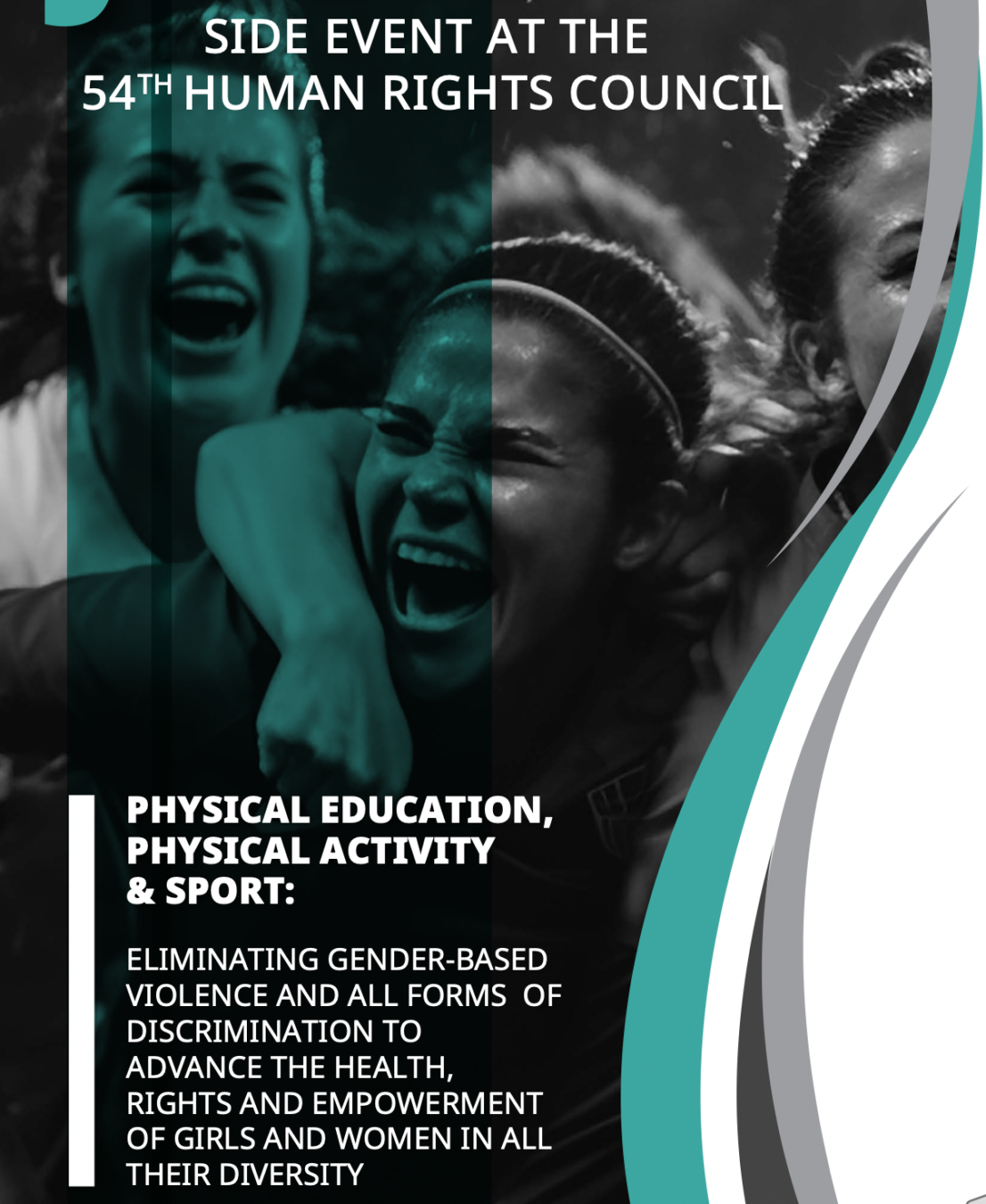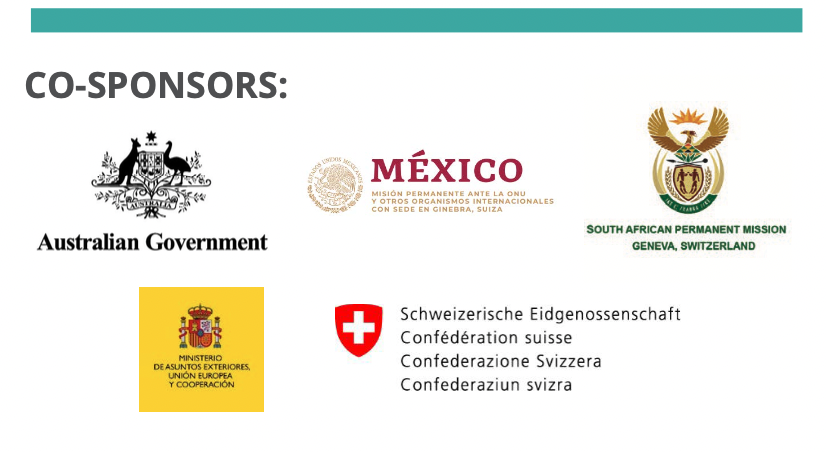Theme: Tools to eliminate gender-based violence and all forms of discrimination to advance the health, human rights and empowerment of girls and women in all their diversity

Geneva, 5 October 2023: In recognition of the power of physical education, physical activity and sport (PEPAS) to advance gender equality and the empowerment of women and girls in all their diversity, the Office of the High Commissioner for Human Rights, (OHCHR), UNESCO, UN Women and The Global Observatory for Gender Equality & Sport organised a side session at the 54th Human Rights Council (54th HRC) in Geneva, Switzerland.
The Governments of Australia, Mexico, South Africa, Spain and Switzerland demonstrated their commitment through their co-sponsorship of the event which brought together women’s rights, gender and sports activists including from The Convention on the Elimination of All Forms of Discrimination against Women (CEDAW), The Caribbean Region anti-Doping Organization (RADO), The Council of Europe, and FIFA. The session was opened by H.E. Mr. Víctor Francos, Secretary of State for Sport, Spain and concluding reflections were made by H.E. Dr Isata Mahoi, Minister of Gender and Children’s Affairs, for Sierra Leone.
While the recently concluded 8th FIFA Women’s World Cup (2023 WWC), watched by a global audience of over 2 billion, is a marker of how far we have come in terms of gender equality and the women’s empowerment, we are also reminded of the multiple challenges and the yawning inequalities faced by the world’s women and girls, including in the sports ecosystem. The 2023 WWC was a stark reminder that women athletes ¨continue to struggle with fewer professional opportunities, massive pay gaps, fewer sponsorships, less airtime, and unequal playing conditions. When women players do succeed, they regularly face a toxic backlash of abuse online and offline¨.
Gender-based violence (GBV), including sexual, psychological, economic and online abuse is widespread in the sports ecosystem. According to a recent study, 21% of female respondents (compared with 11% of male respondents) experienced one form of sexual abuse at least once as a child in sport. On the upside, the 5th September, CEDAW statement which endorsed suspension of the Spanish football chief from his post by FIFA and supported a judicial investigation of his misconduct, stands as a testimony to the global community’s zero tolerance for and commitment to fighting ¨sexual harassment and other forms of GBV violence against women in the world of sports¨.
Physical education, physical activity and Sport (PEPAS) provide tremendous – often untapped – potential and opportunities to advance the human rights, empowerment, health and overall well-being of all women and girls in all their diversity. The physical, psychological, intellectual, social, and economic benefits provided by sports to women and girls and the development of societies overall, are increasingly being recognized. Furthermore, PEPAS offers compelling levers for promoting gender equality and empowerment, and for challenging gender-based discrimination and social norms that limit the life chances of girls and women. In response and recognizing the need for a intersectoral, coordinated and unified response, governments, civil society, UN and other development partners, academia, sports bodies and federations, and the private are mobilizing behind collective action.
The side session highlighted the need; for intersectional and disaggregated data and analyses to drive evidence-based policies and programmes; to leverage existing human rights and gender equality treaty bodies and fora; as well as for multi-sectoral partnerships across issues, oganisations, countries, regions and generations.

Speaker Quotes
Attention, prevention, and reparation of the psychological, physical, and social consequences for the victim of gender violence must be addressed by society as a whole. It is important to raise awareness in society to eradicate gender-based violence and fight against its worst enemy: silence. The High Council for Sports and the Spanish sport community are at the service of the victims of gender violence with absolute condemnation of any violation of women`s rights and any form of aggression. This government has promoted a pioneering sports law which established new tools and protocols for prevention of violence and the protection of victims, including the creation of the figure of the `protection delegate`. We firmly condemn gender violence, and we will always be on the side of victims.
H.E. Mr. Víctor Francos, Secretary of State for Sport, and President of the Consejo Superior de Deportes in Spain
Gender-based violence is prevalence in all sport disciplines ranging from sexual harassment, sexual abuse, publicity, male dominated executive bodies in respective sport bodies, unequal remuneration as compared to their male counterparts and other discriminatory practices. However, the very sport can be used to eliminate gender-based violence. It is clear that through well-developed programmes and policies, the power of sport can scale collective action against gender-based violence – and empower women and girls to succeed in sport and beyond…….My Ministry is thinking of using sports as a tool to address gender-based violence in the upcoming 16 Days of Activism Against Gender Violence. I am in discussions with my colleague and fortunately a female Minister of Sports in Sierra Leone to work together on using sporting platforms to eliminate gender-based violence. Sports indeed can unite people and can go a long way in addressing conflict and violence.
H.E. Dr Isata Mahoi, Minister of Gender Equality and Children’s Affairs, Sierra Leone
Even though significant progress has been made and some results are encouraging …the road to equality is still strewn with pitfalls. Income inequality, lack of support facilities and structures, reluctant sponsors, difficulty in reconciling professional and private life, inadequate media coverage, as well as imbalances within the governing bodies: multiple areas of action remain open or are overlooked…..Let me conclude by underlining our commitment to the Global Observatory for Gender Equality and Sport, which we see as essential for filling knowledge gaps and contributing to capacity building…Switzerland is proud to reiterate its commitment to the Global Observatory today. We would like to use this opportunity to call on Member States, global and regional organizations, sports federations and private companies to support and collaborate with the Observatory. We must all join hands in this endeavor. This is crucial for an inclusive future for all, in and through sport.
Ms Camilla Grosso, First Secretary, Human Rights, Permanent Mission of Switzerland to the UN in Geneva
Sport can be a vector to accelerate progress but it is only through joint efforts across organizations and sectors that we can address inequality and violence against women and girls effectively, in sport and beyond. This is why UNESCO’s Sport flagship, Fit for Life, privileges both an intersectional and cross disciplinary approach, and proposes concrete recommendations like those in the new UNESCO-UN Women publication “Tackling Violence against Women and Girls in Sport: A Handbook for Policy Makers and Sports Practitioners.”
Dr Mariagriazia Squicciarini, Director for Social Policies a.i., Social and Human Sciences Sector, UNESCO
At the UN we have many examples of how we can work efficiently and effectively, including with major sports bodies. The most recent examples are the UNESCO and UN Women’s tackling VAW in sports Handbook and UN Women and IOC Sport for Generation Equality Initiative. We, UNESCO, UN Women, OHCHR and UNHCHR have done some incredible campaigns with FIFA.
Ms Adriana Quinones, Head, Human Rights and Development, UN Women Geneva OfficeThe UN Human Rights Office has increasingly engaged in addressing human rights opportunities and challenges related to sports. It has also actively engaged in providing technical assistance to sports organizations, governments, and civil society to develop policies and programmes that combat discrimination against women and racism in sport, as well as educational initiatives and awareness campaigns, such as the No Discrimination campaign jointly with FIFA. Our endeavours align with the HR75 Initiative, which seeks to fulfil the Universal Declaration of Human Rights promise of freedom, equality, and justice for all.
Caroline Ouaffo Wafang, Advisor Women’s Rights, UN Human Rights OfficeAllow me to remind us all that several CEDAW articles such as Articles 10g and 13c are explicit on the equal right of women to access and participate without discrimination in sports and physical activities. Many others, particularly Articles 3 on measures in all spheres, Article 4 on NGMs; Article 5 on Violence Against W&G; Article 7 on Discrimination in Political and Public Life; Article 11 on Employment; and Article 13 at large on socio-economic opportunities and benefits of women and girls in the context of national development priorities and investment spending including the SDG, also speak implicitly to today’s subject and provide additional entry points and analytical basis for addressing the complexities of gender equality in sports issues. Sadly, the failure to concretely uphold International human rights treaty mechanisms compromises the realization of CEDAW ideals as it relates to women and sports.
Esther Eghobamien-Msheilia, Vice Chair CEDAW CommitteeThe All In Plus joint EU-Council of Europe project is focusing on ensuring there is equal access, opportunities, and support for women and girls in sport, to contribute to a more equitable society where they can thrive on the playing field and in broader socio-cultural and economic spheres.
Olivia Conrad, Senior Project Officer, Joint EU-CoE project All In Plus, Sports Division, Council of EuropeAt FIFA we are committed to fighting discrimination and are resolute in our mission to rid football of all forms of discrimination. We know that football and its unique power and influence can connect and inspire social change, we also know that we cannot do it alone. …Thanks to the powerful collaboration with OHCHR, UNESCO, and UN Women, FIFA`s social impact campaigns spoke and were heard by billions around the world…. By using football as a driver for greater societal change I am sure we can continue to take huge steps forward in the fight for gender equality.
Sarai Bareman, Chief, Women’s Football Officer, FIFASport is not perfect, but it provides one of the best mechanisms for girls and women to succeed. Our goal should therefore be to fix what is not structurally conducive to success and use physical education, physical activity, and sport as tools for advancing the rights, health and empowerment of women and girls in all their diversity.
Dr Sasha Sutherland, Executive Director of the Caribbean Regional Anti-Doping Organization (RADO)There’s a need for data that takes an intersectional approach, to ensure that we are not understanding sports and physical education as separate actions but that they are connected to for example health and public participation and that we have the tools and commitment for tracking of engagement across the life cycle. The Global Observatory provides data and evidence support to government and other actors to strengthen their implementation of interventions and their accountability efforts.
Dr Lombe Mwambwa, Research Director, The Global Observatory for Gender Equality and Sport

